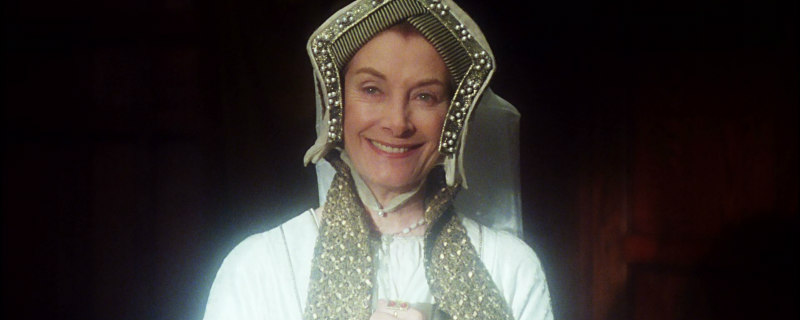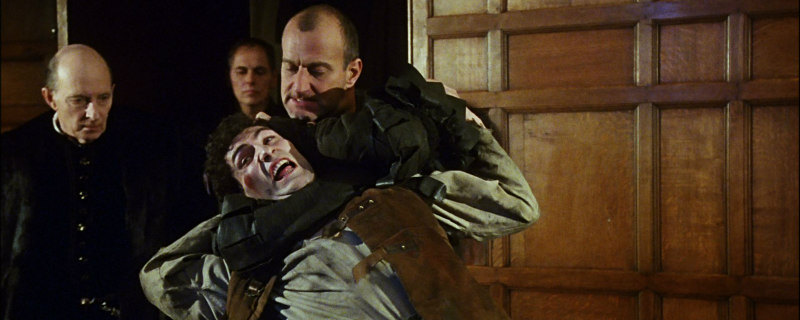
Review by Benjamin Poole
Directed by: John Walsh
Starring: TP McKenna, Jean Marsh, James Coombes

It is always a delight when, through the magic of against-all-the-odds, accidental hoarding and a subsequent (painstakingly enacted) restoration, a film once thought lost for good reappears. John Walsh’s (writer/director/producer) Monarch was filmed in 1996 on 35mm, released briefly in 2000 and then thought to have gone the way of all degradable acetate. However, over a decade later, a working print was eventually relocated and Walsh set about restoring his costume drama to HD quality (rescanning each frame and removing over 10,000 particles ‘by hand’ - crikey!) to re-release the film in 2014, leading to home distribution today. There’s a pleasing congruity between Monarch’s hard won genesis and its mystery narrative, too: as the film stock itself was gradually rediscovered, here also secrets and clandestine plots are slowly disclosed in this historical thriller which concerns an injured Henry VIII and his sinister entourage arriving at a manor house which has been closed for the season (or has it?).


British film’s primary theme, that of class and class boundaries, is exemplified within Monarch’s opening. We see a stable-boy, Will, going about his duties in a roomy pile; sweeping, cleaning the windows, pulling weeds from the garden. Following this montage of hard work, we cut, in an establishing shot of gothic splendour, to the exterior of the house. And what an imposing edifice it is! Lit by lightning, the majestic structure contrasts the britches and boots modesty of Will. Enter a bleeding Henry (TP McKenna - like a regal bear) and his coterie of queeny, sneaky affiliates. Henry is on his uppers; he’s only gone and financially and morally bankrupted dear old Blighty. And the higher you go, the further you fall: Henry may have lost the power of the throne, but he still has his many enemies, with daggers in the dark pointed at his ruffs and doublet. Depicting the fictionalised events of one evening, the heritage scene is set for a ‘situation unfolding that may break the country’ - yikes!

After being bollocked about by the grandstanding politicos who barge in with the wounded king, poor old Will is then set about by a mystery interloper. Thorn (James Coombes) holds a knife to Will’s throat, in order to ascertain the lay out of the mansion, before settling down for a game of chess (symbolism alert) with the hapless stable-boy. In a twist of further dark gothica, bodies start piling up in the candle lit corridors of the house - someone is out to get our king! Who can Henry trust? Class barriers are broken down in the chamber as Henry confides in simple Will; ‘You’re a widower then, ‘enry?’ the oblivious servant enquires, ‘In more ways than one’, comes the darkly comic reply. Henry’s dark night of the soul continues as he hallucinates/witnesses the ghosts of his wives coming back to haunt him (played with delectable enmity by Jean Marsh) and is helpless as his cabinet perishes one by one.
Will such dire events teach Bluff Harry some humility? Not on your nelly. McKenna is the beating heart of Monarch, part wounded bear, part Augustus Gloop petulance - ‘Where’s my wine!’ - his performance is a theatrical pleasure which the rest of the cast gamely attempt to keep up with. There’s more ham on offer here than a king’s banquet, but for someone raised on the Hammer tradition, this sort of aggressive emoting (ie, shouting) is mead from a gilded goblet. There’s an intensity across the board which matches the Shakespearian urgency of the plot twists and Machiavellian implications of the increasingly dire situation, as the double crosses and mistrusts abound.


This menacingly pessimistic view of British history and government (and, as an ex-Tory politico, Walsh should know, amirite?!) is an immensely entertaining gothic melodrama, the creepy details that Walsh weaves into the film, like a dog hungrily licking the spilled blood of a cohort, the secret passageways, the luminescent spectres of the past, give Monarch a striking, idiosyncratic appeal, one that any film fan should be delighted was not lost to history.

Extras:
An abundance here, with documentaries detailing the film’s restoration, an interesting reminiscence on the making of the film (fortified by much luvvie gushing) and a memorial for McKenna, sweetly comprised of amusing anecdotes about the man himself from the cast and his son. These comprehensive and informative bits and pieces are almost as enjoyable as the film itself.

Monarch is on DVD now.
